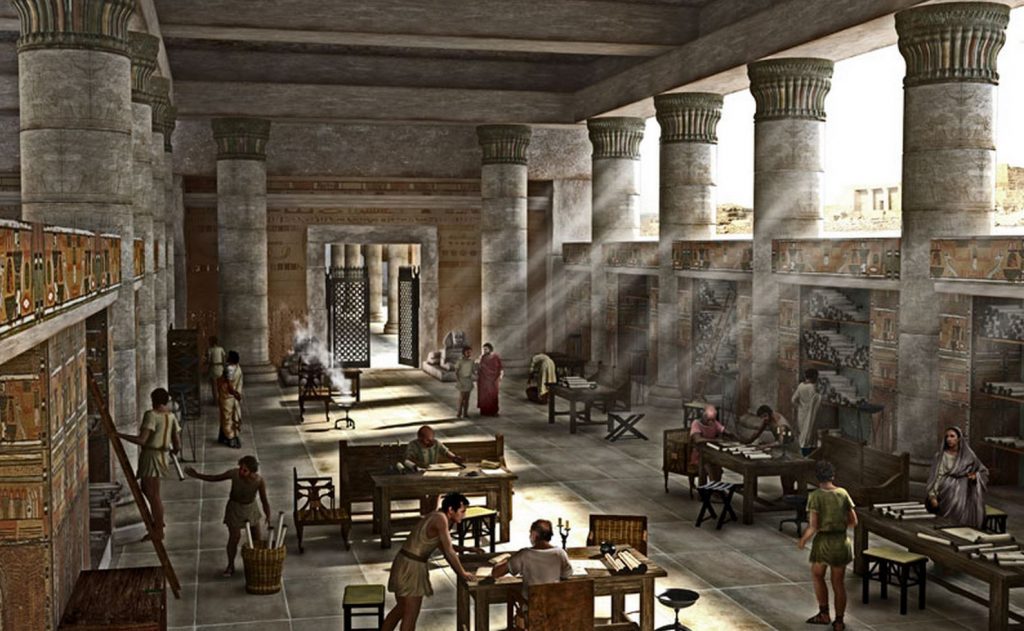Although the Library of Alexandria died, it allowed the formation of ancient culture in the form in which we know it. The poets of the Hellenistic era wrote at the library, whose works have survived to this day and are included in the golden fund of world literature. Among them are the author of the hymns Callimachus, the author of the idylls Theocritus, as well as Apollonius of Rhodes, the creator of the epic poem “Argonautica”. Through the efforts of the Alexandrian philologists, the poems of Homer were finally codified and divided into songs. Finally, in Alexandria, work was carried out to translate the books of the Torah and other works that were eventually included in the Old Testament into Greek.
The founders of the library are considered to be two people from the beginning of the Hellenistic era – Ptolemy I and the philosopher Demetrius of Phaler. Demetrius ended up in Egypt in 297 BC. e. after the death of his Greek patron Kassandra. There he took the place of the king’s trusted advisor and proposed to him the idea of creating a library. Some later authors attribute the founding of the library to Demetrius and Ptolemy II Philadelphus. In any case, Ptolemy II did a lot to expand the library, therefore, along with his father, he can be considered its founder.
The institution received the name – Museion, that is, the community of philosophers where the Muses are worshiped. It was part of the Brujeion palace complex. The complex included a walking area, an exedra, and a building that housed a dining room. Exedra was the audience for the debates and training sessions. In the peripathos (alley with trees) learned conversations took place. The second building of the library, Serapeion, was located in the Egyptian part of the city at the temple of Serapis. Copies of the main library books were kept there.
The basis of the library was the personal collection of Aristotle’s books, which was bought by Ptolemy II. The kings of Egypt were working on collecting books, which they brought not only from Greece, but from distant regions like Sicily. A reward was provided for the brought books. Naturally, there were forgeries, and the task of the Alexandrian scholars was to find out whether the work was genuine before them.
If books were found on ships that stopped in the harbor of the city, they were confiscated in favor of the library. Owners could be given on-site copies. Ptolemy III took state copies of the tragedies of their greatest playwrights on bail in Athens and returned only copies.

According to the authors of scholias to Roman comedies, 42 thousand scrolls were kept in the Serapeion library, and 400 thousand “mixed” and 40 thousand “simple” scrolls were kept in the palace library. There is an argument about the mysterious meanings of the characteristics “mixed” and “simple”. Perhaps the scrolls were mixed, where several works of one or different authors were placed.
Formally, Museion was a fias (religious community) led by a priest (priest). In other sources, the head of Museion was also called a bishop or epistat. The priest was appointed by the king from the Ptolemaic dynasty, and later by the Roman emperor. Also, the ruler of Egypt made a decision to include this or that scientist in the fias. Members of the Museion received state support and salaries. They were also exempted from taxes and public duties.
There are no statistics on the salaries of library workers. It is only known that who lived in the III century BC. e. Panaret received 12 talents a year. The number of permanent members of the fias is unknown. During the heyday of the community, it could reach hundreds of scientists.
The main leisure of the members of the Museion was scholarly pursuits. In addition, they gave lectures and discussed. The kings from the Ptolemaic dynasty became participants in the discussions. Later in the imperial era, Emperor Hadrian, who traveled throughout the empire, took part in the discussions.
The heyday of Museion was the 3rd century BC. e. It was then that the grammarians, poets, astronomers and philosophers who made the glory of Alexandria lived and worked.
The scholars who worked in the library became mentors to the kings of Egypt. The poet Filit Kosky was the mentor of Tsarevich Ptolemy, who later became Tsar Ptolemy II. The prince continued his philological education under the guidance of the grammar Zenodotus of Ephesus. To teach Ptolemy the natural sciences, Strato, nicknamed the Physicist, was invited to Alexandria from the Athenian Lyceum.
The poet Apollonius of Rhodes was the head of the library and the mentor of the future Ptolemy III. In turn, Ptolemy III invited the astronomer Eratosthenes of Cyrene to Alexandria, and Apollonius went back to Rhodes. Eratosthenes became the head of the library and, presumably, the mentor of the king’s children – Ptolemy (future Ptolemy IV) and Arsinoe (future Arsinoe III).
The dependence of Alexandrian scholars on rulers was emphasized and ridiculed by contemporaries. The poet Timon Fliunta called Museion “the basket of the Muses”, hinting that its inhabitants are like birds in cages.
